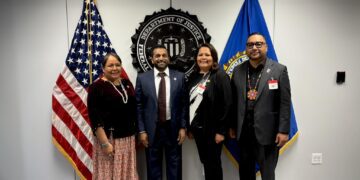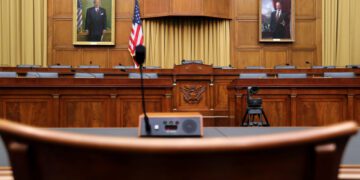By John F. Di Leo -
At 6:32am on Monday morning, January 6, 2020, the US territory of Puerto Rico was hit by an earthquake measuring 5.8 on the Richter scale (accompanied by the usual pre- and post- tremors as well, some very significant, including a 5.0 tremor four hours later).
Damage included everything one would expect from an earthquake: trees and posts falling on cars, property damage in stores and homes as goods crashed to the floor from tables and shelves, major real estate damage as weak foundations or pillars caused balconies and even roofs to collapse… expensive machinery and stock damage as factories were shaken. Roads opened up as potholes and cracks turned into sinkholes, bridges that formerly needed maintenance now need replacement.
Power outages caused loss of perishable food in refrigerators, widespread store and restaurant closures, and likely some deaths in nursing homes and hospitals as those dependent on technology lose their life support without notice. As the reports come in, the damage estimates will only grow.
This is the nature of earthquakes; there’s nothing surprising about such tragedies; it’s true of every natural disaster. Homes and businesses are damaged, medical care is interrupted, infrastructure needs repair, people are hurt or killed.
As tragic as it is, it shouldn’t surprise us. Earthquakes have been hitting populated areas for as long as there have been populations.
Mankind cannot change the weather. For all our wishing and dreaming, the tides are still primarily controlled by the moon, the climate is still primarily controlled by sunspots and our distance from the sun, and seismic activity is caused by the whims of our tectonic plates and the mood of the earth’s core. There’s nothing we can do about it.
But what then causes one earthquake to do more or less damage than another of the same Richter measure? Why is it that a 5.8 in one place might kill nobody, but a 5.8 somewhere else might kill tens of thousands?
That’s where technology does play a role.
The better we build our buildings, the more durably we construct our bridges, the more solidly we build our roads – these are the differences from country to country, and even from province to province, or town to town.
Human decisions – whether to use 100-year shingles or 15-year shingles on our roofs, whether to build deep concrete foundations and durable building frames, or to skip the foundation and live in little more than a tent or shack – these are the kind of choices that make the difference between our facilities surviving a quake or suffering damage or even defeat from it. Do we bury our electric cables underground, or string them from pole to pole?
These decisions aren’t just choices, however. They aren’t just a matter of whether people thought ahead or not. Most of the time, they’re a matter of affordability.
Can we afford strong and deep footings for this bridge? Can we afford a deep concrete foundation for our house? Can the government, the business, or the landlord afford to do it right, or must they just cobble together whatever they can manage, as they scrape by, from year to year?
We see pleas, both from governments and charities, for financial aid whenever a natural disaster hits, anywhere in the world. People try to help rebuild; they send medical aid for the injured, food and clothing for those who lost their property. And we Americans are a generous people; when you add our private contributions to our those of our government, our help tops everyone else’s donations, year in and year out.
Why can we afford to help? Because we are a capitalist economy; we are therefore better able to help than most. Even the best intentions cannot enable a poor socialist country to afford to ship the food, medicine, and building supplies that earthquake sufferers need. Only a productive, prosperous nation is in a position to help. This alone is reason enough for the United States (and the western republics in general) to preserve our capitalist, prosperity-directed economy; without it, we could not help the rest of the world as we do.
But there’s a further lesson: as we have seen, the more durably buildings and other infrastructure are built, the less damage there is, requiring that much less aid. For example:
- The stronger the foundation and structure of a house, apartment, store or factory, the less likely it will be damaged by earthquake.
- The sturdy the bridges and roads are, the less likely they will need substantial rebuilding.
- The wealthier a hospital, nursing home, school or factory, the more likely it is to have backup generators, so it won’t lose power, with all the resulting loss of food, property, and even life that customarily follow.
As we consider the plight of the poor people of Puerto Rico – hit by devastation of both hurricanes and earthquakes now in recent years – let us see if the people of that territory learn a lesson from it.
Puerto Rico, though a possession of the United States, has a great deal of self-rule. They have moved between Republican and Democrat governments, but over the years, have been generally far more bureaucratic, more heavily regulated and taxed, than the mainland USA. Puerto Rico’s style of government has too much in common with those of Latin America, not enough in common with the American laissez-faire system of the encouragement of commerce that they so desperately need.
The lesson to learn – not only from this tragedy but from the conditions of need anywhere on earth – is that the best way to prepare for tragedy is to first build the conditions for prosperity.
In our desire to help people all over the world, for decades we have sent them Peace Corps volunteers, social workers, free clinics and free used clothing. Our missionaries bring building supplies and build them schools and chapels; our corporations send them pallets of drinking water or prepared foods. We are generous to a fault.
But as with other forms of welfare, it creates a level of dependence. Not intentionally, not maliciously, but all this aid serves only an immediate need; it doesn’t help the recipients truly recover.
Let us pray that good people with the power to bring change, effect that change by doing what’s necessary – in regulatory, tax and legal reform – to make these places magnets for commerce.
We have only to look at the past half century in Asia to learn how much can be accomplished if a government sets the right course: Singapore, South Korea and Taiwan were classified as “developing nations” fifty years ago; today they are prosperous. No one is completely immune to natural disasters; a typhoon, volcano or severe earthquake would hurt them too… but not as much as it would hurt still-underdeveloped places like Puerto Rico (and hundreds of other such targets of nature’s fists), because their buildings and infrastructure, both public and private, can be so much stronger than they could before.
Such change can occur quickly. Look at companies like Foxconn, Amazon, and Tesla, as they open new plants and distribution centers in previously vacant or underserved areas. The simple announcement of a new factory’s construction brings with it better roads, better housing, better everything. But you don’t get those companies to move in if your regulatory, tax and legal structure drive them away.
The government isn’t the solution; the private sector is. But the government can often discover that simple changes can transform an area from hostile to welcoming, from the business sector’s point of view.
Because the real solution for places like Puerto Rico – and all other places unfortunate enough to be situated on fault lines, or in the paths of frequent storms or volcanic activity – is to invite the commerce that brings jobs, development, and prosperity – the commerce that moves a region up from 3rd world status to 1st.
And best of all? That economic development isn’t just good when a disaster hits; it’s helpful year ‘round, because that higher standard of living is there to enjoy for all the people who’ve moved up from “just scraping by” to the prosperity that really ought to be the birthright of anyone born in an American territory.
Copyright 2020 John F. Di Leo
John F Di Leo is a Chicagoland-based trade compliance manager, writer and actor. His columns are regularly found in Illinois Review.
Don’t miss an article! Use the free tool in the margin to sign up for Illinois Review’s free email notification service, so you always know when Illinois Review publishes new content!







